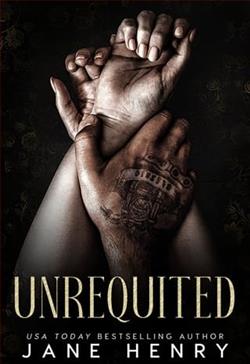Page 2 of The Lovers
Quinn snuggled deeper into the sofa and gazed with affection at the familiar room. The house had once been a private chapel, built by some devoted husband for his devout Catholic wife, but it had been confiscated by the Crown during the Dissolution of the Monasteries and allowed to fall into disrepair once everything of value had been stripped, sold off, or melted down. It stood empty for centuries, forgotten and desolate, before being offered to Captain Lewis Granger, a distant cousin of the family that still owned the estate at the beginning of the nineteenth century.
The young captain had been embroiled in a scandal involving the young wife of a well-respected general, dishonorably discharged from the army just before Waterloo, and sent home to England. He had disgraced himself to the point where he could no longer show his face in London, at least for a time, and so he appealed to his cousin, begging for sanctuary, which Squire Granger reluctantly offered. Lewis Granger might have been a libertine and a gambler, but he had a penchant for architecture and history. He turned the ruin into a home, rebuilding the crumbling structure with his own two hands and the help of a few lads from the village, who were more than happy to earn a few quid during a time when well-paying jobs were scarce and returning soldiers tried to pick up the pieces of their lives and find any employment going.
Squire Granger had been so impressed with Lewis’s efforts that he bequeathed the chapel to Lewis in his will, and it had remained in the family until the last descendant sold the house to Quinn three years ago. Niles Granger was a young man who was thoroughly at odds with Lewis’s legacy. His spiky hair was dyed platinum blond; he wore unbearably narrow trousers and horn-rimmed spectacles, proclaiming himself to be a hipster and an artist. Niles had no interest in history or architecture, and he wanted nothing more than to get away from all that “old shite,” as he so eloquently described it. He unloaded it gleefully and never looked back, using the profits to buy a dilapidated loft with space for a studio, where he created works of unfathomable modernity using splashes of bright colors, bits of trash, and phallic symbols strategically displayed for maximum shock value.
The rest of the estate had been bought years earlier by an eccentric millionaire who converted the huge manor house into Lingfield Park Resort. Despite its proximity to the resort, Quinn’s house felt completely private. The chapel was nestled in the woods at the edge of the property; none of the guests ever ventured in thatdirection, warned off by thePrivate Propertysign nailed to a tree and a lack of a walkable path. There was a narrow lane, just wide enough for one car to pass on the other side of the house, which led into the village, but the lane saw so little traffic that Quinn felt as if she were living alone in the woods.
Now, three years later, Quinn was still charmed by the stained-glass windows set high in the stone walls and vaulted ceilings painted with an image of the heavens. Not much had remained of the original chapel, but there was something about it that always made Quinn feel welcome and at home. She supposed it was all the hopes, dreams, and prayers that had been absorbed by the stones over the years. Prayers didn’t just dissipate into thin air—they soaked into the walls, buttressing the structure with their strength and healing energy. As an archeologist, she found it immensely appealing to live in a place that was imbued with so much character and steeped in history.
When originally built, the chapel had been one large open space, but Lewis Granger had divided it into two rooms, the back room serving as a bedroom and furnished with an antique four-poster bed and carved dresser, which Niles had been only too happy to throw in as part of the deal. The dark wood was polished to a shine, the bed hangings made of embroidered damask in mauve and gold. Once that bed had been the center of Quinn’s universe, the place where she spent lazy afternoons with Luke as they made love, shared their dreams, and made plans for the future. Now the bed was used only for sleeping and reading when sleep wouldn’t come.
Quinn still felt fragile and bruised by Luke’s sudden desertion, but now being on her own didn’t seem as frightening as it had two months ago when she suddenly found herself single. She’d felt adrift for a while, remembering several times a day that she no longer had anyone to return to. But like all shocks to the system, the knowledge eventually became part of her new reality,and Quinn threw herself into her work, eager to feel like her old self again. There had been a few offers and casual flirtations at the dig, but nothing that blossomed into anything real; she supposed she hadn’t allowed it to. She hadn’t been ready to move on.
At first, Quinn managed to forget about Luke for a few hours at a time, then for whole days, but now she was back home, and her loneliness was suddenly sharper and so much more oppressive than it had been in Jerusalem, where she was surrounded by people. The silence of the chapel, which she normally found soothing, weighed heavily on her, its density disturbed only by the sound of the falling rain and the ticking of the clock.
Quinn took a sip of tea and closed her eyes. She hated rainy days; they forced her to stay indoors. On fine days, she went for long country walks, walking until she exhausted herself enough to enjoy a few hours of dreamless sleep. But on a day like today, there was nothing to do but brood. She didn’t even have a dog. Her job demanded frequent absences, and it wouldn’t be fair to leave a puppy behind to be looked after by someone else for months on end. She did wish for a companion though. Perhaps she could get a little dog and leave it with her parents when she went overseas. The thought cheered her up as she imagined a furry little ball of affection snuggled in her lap, making her feel less alone.
Quinn nearly spilled her tea when there was a loud knock at the door. She wasn’t expecting any visitors, not so soon after arriving at home, and there was no one she could think of who’d just drop by unannounced. Quinn set her mug down and went to answer the door. Perhaps it was one of the guests from the resort who’d ventured too far off the path and got lost. Quinn opened the door, surprised to find an actual visitor.
“May I come in, or do I have to stand here in the rain?” Gabriel Russell asked as he smiled down at her.
“Of course. Sorry, Gabe. Come on in. May I offer you some tea?”
“You sure can. And add a dollop of whiskey, for medicinal purposes,” he joked as he took off his wet coat and hung it on a coatrack before taking a seat on the sofa in front of the roaring fire.
Quinn held out the mug to Gabe and reclaimed her spot on the sofa. The melancholy that crept up on her earlier was gone, and she was suddenly grateful for the unexpected visit. Gabriel Russell wasn’t just her boss but also one of her closest friends. They’d met years ago on a dig in Ireland when she was just a student and he was the dig supervisor and had remained close ever since, always staying in touch even during the most tumultuous moments of their lives. Gabe invited her to join the faculty at UCL Institute of Archeology when he accepted the position as head of the Archeology Department, and they shared a nice, comfortable relationship unmarred by stodgy professionalism or academic rivalry. They wanted different things, and Gabe, who preferred a desk job to digging in the dirt, supported Quinn and rejoiced in her success. Luke had taught several classes at the institute as well, using Quinn’s friendship with Gabe as a way in.
Gabe was in his late thirties, with shaggy dark hair worn just a little too long and dark blue eyes fringed with ridiculously long lashes. His nose was a trifle long, and his eyebrows curved like wings above his hooded eyes, making him look stern and unapproachable at times, but that was only until he smiled. Gabe had a radiant smile that made him look sheepish and endearing at the same time. He could probably charm the knickers off Her Majesty, if they ever had occasion to be in the same room, which was why he was as popular with the faculty as he was with the students.
Few people knew this, but Gabe could trace his roots back to the Norman invasion, having descended from Hugh de Rosel,who’d accompanied William the Conqueror to the shores of England and had been rewarded for his loyalty with estates in Dorset. Gabe’s family still lived in Berwick, although Gabe was the only male left of the noble line. It was Gabe’s grandfather’s obsession with history that influenced young Gabe and led to a degree in history and archeology.
Quinn folded her slim legs beneath her and turned her gaze to Gabe as she took a sip of her own tea, eager to hear what brought Gabe to her door on such a filthy night. He’d never been one for unannounced visits, so whatever it was had to be important.
“It’s really coming down out there. I nearly missed the turn; I didn’t see the sign for the village. Are you over the worst of the jet lag?” Gabe asked as he studied her features. Gabe had always detested small talk, but after several years of interdepartmental politics, he learned not to blurt out what was on his mind, as he had done when he was younger. Quinn smiled into her mug. She found this newfound political correctness somewhat amusing but went along with it, nonetheless. Gabe would get to the point eventually, and she was in no rush for him to leave.
“It took about two days to adjust, but I’m back to my usual routine. It’s nice to be home.”
“Oh? Looking forward to a nice long winter, are you?” he joked.
“After roasting in the desert for six months, a cold winter sounds like a dream come true. I won’t even complain about snow.”
“We’ll see about that. I wouldn’t say no to a couple of weeks in a warm sunny place. Haven’t had a holiday in longer than I can remember. Ibiza would do me very well right about now.”
“Maybe you can take Eve after Christmas,” Quinn suggested. Gabe always spent Christmas with his parents but liked to take off for a week after the holiday, having had enough family togetherness, particularly since his mother had a long list of chores for him to complete before returning to London. Being an only child, it fell to him to see to the never-ending repairs needed to maintain the family home. His father was getting on in years and could no longer manage the upkeep on his own, but was too stubborn to hire a handyman.
“Actually, Eve and I are no longer, but that’s not why I’m here,” Gabe said but didn’t elaborate. Eve had been the latest in a string of women in Gabe’s life, an editor at a fashion magazine who was glamorous, vivacious, and dangerously independent. She was the type of woman who had lovers, not partners, and Quinn strongly suspected that she’d moved on to someone else while Gabe wasn’t looking. Quinn never could understand why a man as intelligent and warm as Gabe always went for women who could never quite give him their full attention and bailed at the first sign of trouble. She had never known Gabe to be truly in love with any of his amours and wondered what kept him from finding someone who could really touch his heart.
Perhaps he feared commitment, or was wary of getting hurt. After her experience with Luke, Quinn could commiserate. She’d always craved a relationship that could sustain her, but her choice of partners hadn’t been any wiser than Gabe’s. There had been a few men who professed to love her, but sadly, she’d never become their number one priority and was discarded as soon as something better came along, as it had with Luke. The future she offered him couldn’t compete with a professorship at Harvard University.
Quinn was actually surprised that Gabe made no mention of Luke’s departure. Luke would have informed him since he’d been on the faculty and would have had to give notice.PerhapsGabe even warranted a phone call or an email, and not just a text, Quinn thought bitterly.
“So, whyareyou here on a rainy Friday night?” Quinn asked, her expression coy. The last thing she wanted to do was discuss Luke or Eve, but she was too curious to remain silent any longer.
“Have you seen the news?” Gabe asked as he took a sip of his whiskey-laced tea and sighed with pleasure as the alcohol hit his bloodstream.
“No, why?”
“Human remains were discovered yesterday at a construction site in Mayfair. They’d just broken ground a few days ago for another building of luxury flats few of us can afford. It seems there was a hidden chamber belowground that never appeared in the blueprints.”















